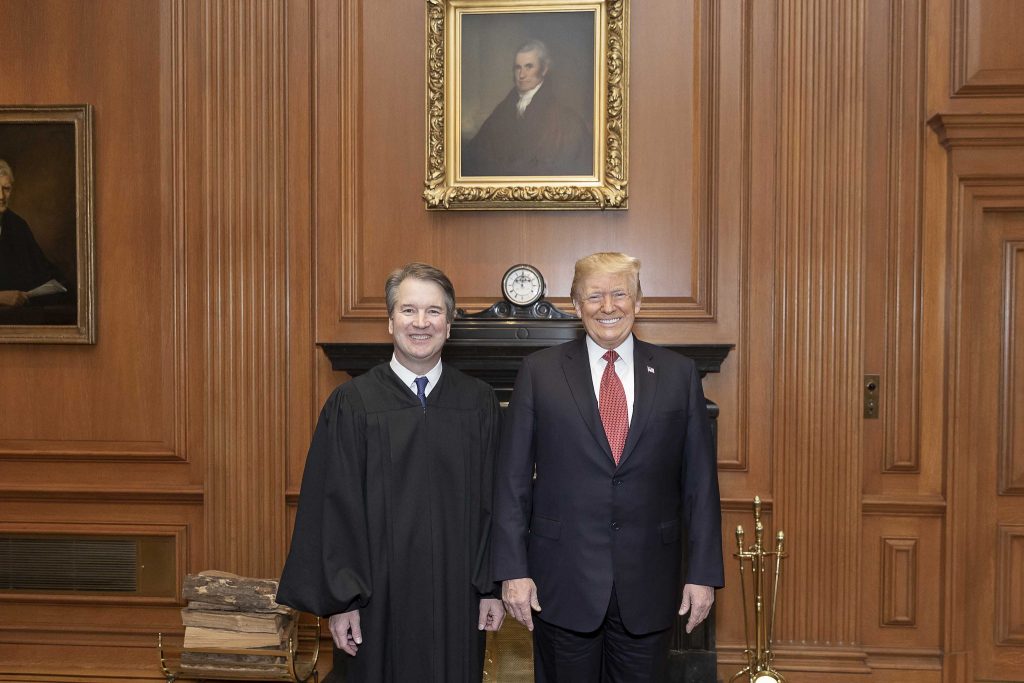
In a 5-4 ruling issued late in the day on February 7, the Supreme Court temporarily blocked a Louisiana law that likely would have put the majority of the state’s abortion providers out of business while running afoul of recent Supreme Court precedent.
Perhaps most interesting and significant aspect of the decision for the immediate future of the court was the composition of the majority and minority sides. Chief Justice John Roberts, a conservative appointed by President George W. Bush, joined the court’s so-called “liberal bloc” of four justices appointed by Democratic presidents to block the law.
Justices Samuel Alito, Clarence Thomas, Neil Gorsuch and Brett Kavanaugh voted to allow Louisiana’s law to go into effect. Justice Kavanaugh wrote a dissent arguing that the majority erred in blocking the law, providing more ammunition to critics who say – and have said since Kavanaugh was first nominated to the court – that the newest justice is intent on attacking the landmark Roe v. Wade decision.
What the Louisiana Law Did
Passed in 2014 but not yet enforced, the Louisiana law fits with a broader pattern of red states attempting to chip away at abortion access without running afoul of Roe’s core protections. While abortion remains legal in the United States, Republican legislators across the country have succeeded in making it difficult for women to actually access the procedure.
Louisiana’s law required doctors performing abortions to acquire admitting privileges at a hospital within 30 miles of their clinics. Admitting privileges enable a doctor to admit a patient at a given hospital and treat them there.
The state argued that the regulation was necessary to protect the health of women seeking abortions, saying that a doctor should be able to admit a woman at a nearby hospital in case something went wrong during the abortion procedure.
Critics argued the law provided no real medical benefit to patients and said abortion providers often struggled to secure admitting privileges as a result of local hospitals’ opposition to abortion.
The Legal Controversy
In 2016, the Supreme Court heard the case of Whole Women’s Health v. Hellerstedt, which dealt with the constitutionality of a Texas admitting privileges law that was very similar to Louisiana’s. Reduced to eight justices after the death of Justice Antonin Scalia, the court ruled by a 5-3 margin that the Texas law was unconstitutional. Justice Anthony Kennedy, whose 2018 resignation eventually placed Brett Kavanaugh on the court, joined with Justices Sonia Sotomayor, Elena Kagan, Ruth Bader Ginsburg and Stephen Breyer in striking down the law.
However, the ruling in Whole Women’s Health did not prevent the Fifth Circuit Court of Appeals from giving the Louisiana law a green light in the fall of 2018. A three-judge panel ruled in Louisiana’s favor after a lengthy analysis purported to show that the law would not unduly burden women seeking abortions.
The dissenting judge on the panel disagreed, as did women’s health advocates in the state. A district judge said that two of the state’s three abortion clinics would have to close if the law went into effect, a finding the appeals court panel dismissed. Both sides agreed that complications requiring hospital admissions during an abortion are rare, though the Fifth Circuit panel argued the admitting privileges requirement did provide women with a real benefit.
The Center for Reproductive Rights filed an emergency appeal to the Supreme Court and secured the 5-4 decision to stay the law. It’s important to understand that the court did not strike down the full law, and it will likely agree to take up the case for full oral arguments at some point in 2019.
Justice Kavanaugh’s Opinion and the New Normal
As is traditional in emergency appeals, the majority did not issue an opinion explaining its decision. Justice Kavanaugh was the only member of the court to write an opinion, and the other three conservatives in the minority did not sign on to his dissent.
In his dissent, Kavanaugh argued that the CPR had acted too hastily in challenging the law, saying the group should have waited for Louisiana’s law to go into effect before going to court. Justice Kavanaugh echoed the Fifth Circuit in saying that Louisiana’s abortion providers had not worked hard enough to obtain admitting privileges and wrote that the state would be deferential to the needs of abortion clinics.
The dynamic at play in the case, June Medical Services v. Gee, is likely to play out over the next several years under the current composition of the Supreme Court. When Justice Kennedy retired, he was replaced as the court’s swing justice by Chief Justice Roberts. While Justice Roberts is a conservative, he’s considered an institutionalist and an incrementalist with a keen desire to protect the court’s legitimacy. How far and how fast he’s willing to go in re-writing Supreme Court precedent with a conservative majority on the court is one of the most important open questions in the American legal system.
Justice Kavanaugh, for his part, seemingly made clear in June Medical Services that recent precedent would not prevent him from attempting to restrict abortion rights. When Maine’s Republican Senator, the pro-choice Susan Collins, cast what was essentially the decisive vote for then-Judge Kavanaugh in 2018, she argued he could be trusted to respect precedent and protect women’s access to the reproductive services to which the court has said they are constitutionally entitled. Now, it seems, that trust was profoundly misplaced.



Susan Collins has never voted against a Supreme Court Justice and was not expected to grow a spine to defy her party’s vote for Kavanaugh.
Let’s throw her out in 2020.